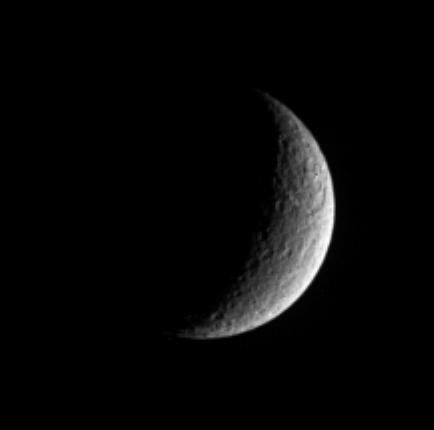Reminder of Ages Past

| PIA Number | PIA08186 |
|---|---|
| Language |
|
Rhea displays a prominent scar in this view from Cassini. A large and ancient impact basin can be seen at upper right. The giant feature occurs within a terrain that appears rugged and which likely is saturated with other smaller craters.
Rhea is Saturn's second-largest moon at 1,528 kilometers (949 miles) across. This view shows terrain on the moon's trailing hemisphere. North is up.
The image was taken in polarized ultraviolet light with the Cassini spacecraft narrow-angle camera on April 24, 2006 at a distance of approximately 2 million kilometers (1.2 million miles) from Rhea and at a Sun-Rhea-spacecraft, or phase, angle of 117 degrees. Resolution in the original image was 12 kilometers (7 miles) per pixel. The image has been magnified by a factor of two and contrast-enhanced to aid visibility.
The Cassini-Huygens mission is a cooperative project of NASA, the European Space Agency and the Italian Space Agency. The Jet Propulsion Laboratory, a division of the California Institute of Technology in Pasadena, manages the mission for NASA's Science Mission Directorate, Washington, D.C. The Cassini orbiter and its two onboard cameras were designed, developed and assembled at JPL. The imaging operations center is based at the Space Science Institute in Boulder, Colo.
For more information about the Cassini-Huygens mission visit http://saturn.jpl.nasa.gov . The Cassini imaging team homepage is at http://ciclops.org .
Credit:NASA/JPL/Space Science Institute
